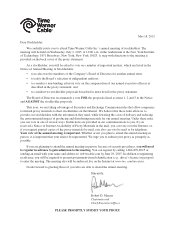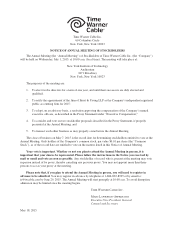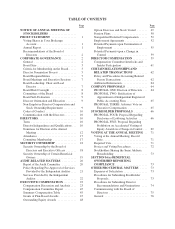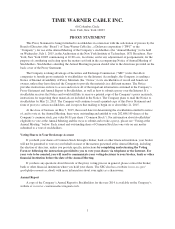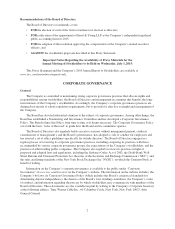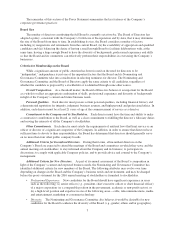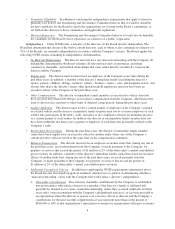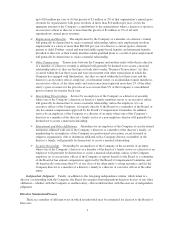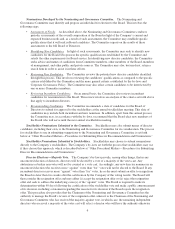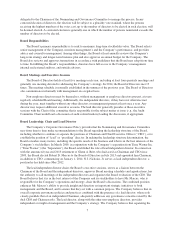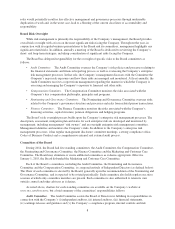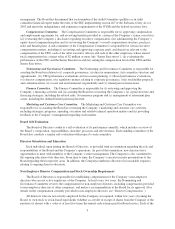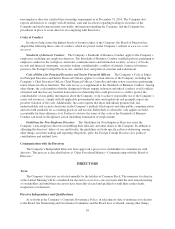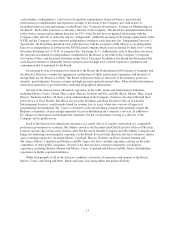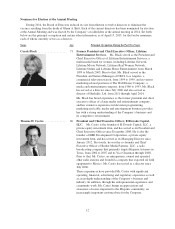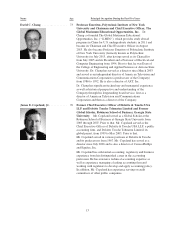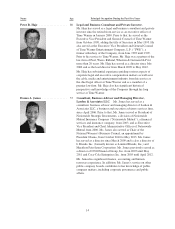Time Warner Cable 2015 Annual Report Download - page 10
Download and view the complete annual report
Please find page 10 of the 2015 Time Warner Cable annual report below. You can navigate through the pages in the report by either clicking on the pages listed below, or by using the keyword search tool below to find specific information within the annual report.
•Committee Eligibility. In addition to satisfying the independence requirements that apply to directors
generally (see below), the Nominating and Governance Committee believes that it would be desirable
for new candidates for the Board to satisfy the requirements for serving on the Board’s committees, as
set forth in the charters for those committees and applicable regulations.
•Director Experience. The Nominating and Governance Committee believes it would also be desirable
for candidates for the Board to have experience as a director of a public corporation.
Independence. Under NYSE rules, a majority of the directors on the Board must be independent. The
Board has determined that eleven of the twelve current directors, each of whom is also a nominee for director (or
92% of the Board), are currently independent in accordance with the Company’s criteria. The Board applies the
following NYSE criteria in making its independence determinations.
•No Material Relationship. The director must not have any material relationship with the Company. In
making this determination, the Board considers all relevant facts and circumstances, including
commercial, charitable, and familial relationships that exist, either directly or indirectly, between the
director and the Company.
•Employment. The director must not have been an employee of the Company at any time during the
past three years. In addition, a member of the director’s immediate family (including the director’s
spouse; parents; children; siblings; mothers-, fathers-, brothers-, sisters-, sons- and daughters-in-law; and
anyone who shares the director’s home, other than household employees) must not have been an
executive officer of the Company in the prior three years.
•Other Compensation. The director or immediate family member (as an executive officer) must not
have received more than $100,000 per year in direct compensation from the Company, other than in the
form of director fees, pension or other forms of deferred compensation, during the past three years.
•Auditor Affiliation. The director must not be a current partner or employee of the Company’s internal
or external auditor and the director’s immediate family member must not be a current employee of such
auditor who participates in the firm’s audit, assurance or tax compliance (but not tax planning) practice
or a current partner of such auditor. In addition, the director or an immediate family member must not
have been within the last three years a partner or employee of such firm who personally worked on the
Company’s audit.
•Interlocking Directorships. During the past three years, the director or immediate family member
cannot have been employed as an executive officer by another entity where one of the Company’s
current executive officers served at the same time on the compensation committee.
•Business Transactions. The director must not be an employee of another entity that, during any one of
the past three years, received payments from the Company, or made payments to the Company, for
property or services that exceed the greater of $1 million or 2% of the other entity’s annual consolidated
gross revenues. In addition, a member of the director’s immediate family cannot have been an executive
officer of another entity that, during any one of the past three years, received payments from the
Company, or made payments to the Company, for property or services that exceed the greater of
$1 million or 2% of the other entity’s annual consolidated gross revenues.
•Additional Categorical Criteria. In addition to applying the NYSE requirements summarized above,
the Board has also developed categorical standards, which it uses to guide it in determining whether a
“material relationship” exists with the Company that would affect a director’s independence:
➢Charitable Contributions. Discretionary charitable contributions by the Company to established
non-profit entities with which a director or a member of the director’s family is affiliated will
generally be deemed not to create a material relationship, unless they occurred within the last three
years and (i) were inconsistent with the Company’s philanthropic practices; or (ii) were provided to
an organization where the director or spouse is an executive officer or director and the Company’s
contributions for the most recently completed fiscal year represent more than (a) the greater of
$100,000 or 10% of that organization’s annual gross revenues for organizations with gross revenues
4

